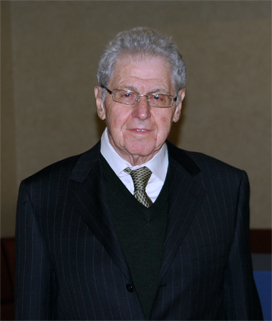Walter Brenner facts for kids
Quick facts for kids
Walter Brenner
|
|
|---|---|

Walter Brenner in 2012
|
|
| Born | July 21, 1923 |
| Died | December 6, 2017 (aged 94) New Jersey, U.S.
|
| Nationality | American |
| Alma mater | Polytechnic Institute of Brooklyn |
| Scientific career | |
| Fields | Chemical engineering |
| Institutions | Polytechnic Institute, New York University, Master Bond Inc. |
| Doctoral advisor | Donald Othmer |
Walter Brenner (born July 21, 1923, died December 6, 2017) was an American professor and inventor. He taught chemical engineering, which is about how chemicals are made and used. Dr. Brenner also wrote many books and had patents for his inventions. He was a leader in using strong radiation to change plastics (polymers) for things like airplanes, hospitals, and everyday products. He passed away in 2017 when he was 94 years old.
Early Life and Learning
Walter Brenner was born in Vienna, Austria, in July 1923.
In 1938, his family had to leave Austria. They were escaping the Nazi occupation, which was when Nazi Germany took over Austria. The family moved to the United States. Walter went to James Madison High School in Brooklyn, New York. In 1940, he started college at the City University of New York. He earned a bachelor's degree in Chemical Engineering.
In 1943, Walter Brenner joined the U.S. military. He became a technical sergeant and served until 1945. After his military service, he went to the Polytechnic Institute of Brooklyn. There, he earned his Master's degree in 1949. Later, in 1954, he completed his doctorate in chemical engineering. He studied under a famous professor named Donald Othmer.
His Career and Inventions
Dr. Brenner was a full professor at New York University for more than 25 years. He taught chemical engineering to students. He taught at both the Bronx and Greenwich Village campuses. Because he was so good at what he did, many companies, government groups, and military branches asked him for advice. He worked as a consultant throughout his career.
In 1976, Dr. Brenner and his son, James, started a company called Master Bond Inc. This company makes special chemical products. Dr. Brenner created unique systems like epoxy-based glues (adhesives), sealants, coatings, and materials for protecting things (encapsulants). Master Bond also makes products using silicone, polysulfide, polyurethane, and UV light curing systems. These products are used in many different industries.
 | Bessie Coleman |
 | Spann Watson |
 | Jill E. Brown |
 | Sherman W. White |

